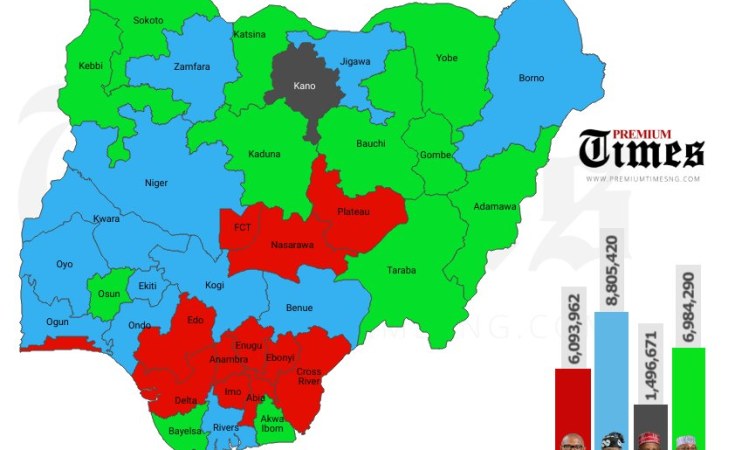A PREMIUM TIMES tally of the results shows that Mr Tinubu leads his closest challenger, Atiku Abubakar of the PDP, with over 1.8 million votes.
Bola Tinubu, the presidential candidate of Nigeria’s ruling party, APC, has scored majority votes in the presidential election held on Saturday across the country.
Although the final results have not been declared at the national collation centre in the Nigerian capital, Abuja, electoral officials in the 36 states and Abuja have announced the results for each state.
A PREMIUM TIMES tally of the results shows that Mr Tinubu leads his closest challenger, Atiku Abubakar of the PDP, with over 1.8 million votes after the summation of results from the 36 states and Abuja
Mr Tinubu, the former governor of Lagos State, has so far garnered 8,805,420 votes. He also won the elections in 12 states.
Atiku scored 6,984,290 votes and he also won in 12 states.
The Labour Party candidate, Peter Obi, is following closely with 12 states won and 6,093,962 votes garnered.
In fourth position is Rabiu Kwankwaso who has 1,496,671 votes and won a state – Kano State.
Mr Tinubu won the elections in Rivers, Borno, Jigawa, Zamfara, Benue, Kogi, Kwara, Niger, Osun, Ekiti, Ondo, Oyo and Ogun states.
Atiku won in Katsina, Kebbi, Sokoto, Kaduna, Gombe, Yobe, Bauchi, Adamawa and Taraba states. He also won in Osun, Akwa Ibom and Bayelsa states.
Mr Obi won in Edo, Cross River, Delta, Lagos, FCT, Plateau, Imo, Ebonyi, Nasarawa, Anambra, Abia and Enugu states.
Apart from scoring the constitutionally required majority votes, Mr Tinubu also appears to have met the second requirement of 25 per cent of the votes in 25 states (two-thirds of Nigeria’s 36 states and Abuja).
25% requirement
Section 134 of the constitution stipulates the requirements a candidate must meet to be declared the winner of a presidential election.
The section states that: “(1) A candidate for an election to the office of the President shall be deemed to have been duly elected, where, there being only two candidates for the election
“(a) he has the majority of votes cast at the election; and
“(b) he has not less than one-quarter of the votes cast at the election in each of at least two-thirds of all the States in the Federation and the Federal Capital Territory, Abuja.”
Some people have interpreted section b above to mean that the winner must score 25 per cent of the votes in Abuja, but the majority of lawyers say the interpretation simply treats Abuja as the 37th state of Nigeria and thus 25 per cent in 25 states suffices.
Based on the INEC results, Mr Tinubu has a minimum of 25 per cent in 30 states. Atiku has a minimum of 25 per cent in 21 states while Mr Obi scored a minimum of 25 per cent in 17 states.ⓘ
Possible Scenarios
As of 10:30 p.m. on Tuesday, the final collation of results was still ongoing at the national collation centre in Abuja.
At that centre, apart from reviewing the total votes scored by each candidate and the 25 per cent spread, officials will also review the total number of cancelled votes across all the states.
The figures would be computed to check if the cancelled votes are more than the margin of victory; a situation that may lead to supplementary elections in the affected polling units.
Should that not be the case, Mr Tinubu would be declared the winner of the election and the president-elect.
LP/PDP call for cancellation
While the APC and its supporters may be in an upbeat mood based on the results, the PDP and the LP have called for the cancellation of the results.
The PDP and LP made their positions known at a Tuesday press conference attended by their vice-presidential candidates, Ifeanyi Okowa and Datti Baba-Ahmed, respectively.
“The election was a sham, and never free and fair,” said Mr Okowa of the PDP, a position corroborated by the LP’s vice-presidential candidate.
Their main grouse is that INEC failed to upload the results of elections in the over 170,000 polling units onto a central server (IReV) as required by law. That step should have been done before the collation and announcement of results, they said.
At the press conference, the two parties also demanded that the chairman of INEC, Mahmood Yakubu, must step aside over what they described as electoral irregularities and malfeasance. INEC has since replied, saying its chairman would not resign and that any party aggrieved with the election process should follow the law to air its grievances.


